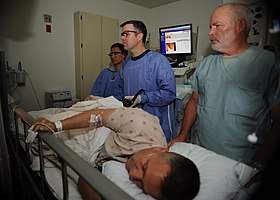
Back Kolonoskopie AF تنظير القولون Arabic کولونوسکوپی AZB Колоноскопия Bulgarian কোলনোস্কপি Bengali/Bangla Kolonoskopija BS Colonoscòpia Catalan Koloskopie Czech Koloskopie German Κολονοσκόπηση Greek
| Colonoscopy | |
|---|---|
 Colonoscopy being performed | |
| ICD-9-CM | 45.23 |
| MeSH | D003113 |
| OPS-301 code | 1-650 |
| MedlinePlus | 003886 |
Colonoscopy (/ˌkɒləˈnɒskəpi/) or coloscopy (/kəˈlɒskəpi/)[1] is a medical procedure involving the endoscopic examination of the large bowel (colon) and the distal portion of the small bowel. This examination is performed using either a CCD camera or a fiber optic camera, which is mounted on a flexible tube and passed through the anus.[2][3]
The purpose of a colonoscopy is to provide a visual diagnosis via inspection of the internal lining of the colon wall, which may include identifying issues such as ulceration or precancerous polyps, and to enable the opportunity for biopsy or the removal of suspected colorectal cancer lesions.[4][5]
Colonoscopy is similar in principle to sigmoidoscopy, with the primary distinction being the specific parts of the colon that each procedure can examine. The same instrument used for sigmoidoscopy performs the colonoscopy. A colonoscopy permits a comprehensive examination of the entire colon, which is typically around 1,200 to 1,500 millimeters in length.[6]
In contrast, a sigmoidoscopy allows for the examination of only the distal portion of the colon, which spans approximately 600 millimeters.[7] This distinction is medically significant because the benefits of colonoscopy in terms of improving cancer survival have primarily been associated with the detection of lesions in the distal portion of the colon.[8]
Routine use of colonoscopy screening varies globally. In the US, colonoscopy is a commonly recommended and widely utilized screening method for colorectal cancer, often beginning at age 45 or 50, depending on risk factors and guidelines from organizations like the American Cancer Society.[9] However, screening practices differ worldwide. For example, in the European Union, several countries primarily employ fecal occult blood testing (FOBT) or sigmoidoscopy for population-based screening.[10] These variations stem from differences in healthcare systems, policies, and cultural factors. Recent studies[11] have stressed the need for screening strategies and awareness campaigns to combat colorectal cancer - on a global scale.[12][13]
- ^ "Colonoscopy". The American Heritage Medical Dictionary. Houghton Mifflin Company. Archived from the original on 12 May 2021. Retrieved 28 October 2012 – via thefreedictionary.com.
- ^ "Recommendation: Colorectal Cancer: Screening | United States Preventive Services Taskforce". www.uspreventiveservicestaskforce.org. Archived from the original on 10 November 2023. Retrieved 10 November 2023.
- ^ "Colonoscopy - NIDDK". National Institute of Diabetes and Digestive and Kidney Diseases. Archived from the original on 3 May 2022. Retrieved 10 November 2023.
- ^ Orr L. "Do Colonoscopies Prevent Colon Cancer?". URMC Newsroom. Archived from the original on 7 November 2023. Retrieved 7 November 2023.
- ^ Waye JD, Aisenberg J, Rubin PH (18 April 2013). Practical Colonoscopy (1 ed.). Wiley. doi:10.1002/9781118553442. ISBN 978-0-470-67058-3. Archived from the original on 10 November 2023. Retrieved 10 November 2023.
- ^ "Small & Large Intestine Whereas a sigmoidoscopy is purposefully examining only the distal (left) side of the colon". SEER Training. Archived from the original on 7 November 2023. Retrieved 7 November 2023.
- ^ "Flexible sigmoidoscopy". www.cancerresearchuk.org. Archived from the original on 10 November 2023. Retrieved 10 November 2023.
- ^ "Recommendation: Colorectal Cancer: Screening". United States Preventive Services Task Force. Archived from the original on 7 November 2023. Retrieved 7 November 2023.
- ^ "Colorectal Cancer Guideline". www.cancer.org. Archived from the original on 7 November 2023. Retrieved 7 November 2023.
- ^ "Statement on the Council cancer screening recommendations". FEAM. Archived from the original on 7 November 2023. Retrieved 7 November 2023.
- ^ Wong MC, Huang J, Liang PS (October 2023). "Is the practice of colorectal cancer screening questionable after the NordICC trial was published?". Clinical and Translational Medicine. 13 (10): e1365. doi:10.1002/ctm2.1365. PMC 10550029. PMID 37792640.
- ^ Audibert C, Perlaky A, Glass D (September 2017). "Global perspective on colonoscopy use for colorectal cancer screening: A multi-country survey of practicing colonoscopists". Contemporary Clinical Trials Communications. 7: 116–121. doi:10.1016/j.conctc.2017.06.008. PMC 5898517. PMID 29696175.
- ^ Hayman CV, Vyas D (January 2021). "Screening colonoscopy: The present and the future". World Journal of Gastroenterology. 27 (3): 233–239. doi:10.3748/wjg.v27.i3.233. PMC 7814366. PMID 33519138.